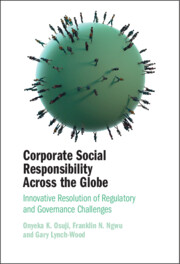 Corporate Social Responsibility Across the Globe
Corporate Social Responsibility Across the Globe from Part III - Stimulating Private Regulation of Corporate Social Responsibility
Published online by Cambridge University Press: 15 June 2023
This chapter focuses on the critical corporate governance role of outsiders providing professional advisory services in promoting corporate social responsibility (CSR). It draws on insights from responsive regulation and institutional theories to make the case for including professional advisory services such as accounting and auditing firms, management consultancies, rating agencies, external company secretaries, and public relations, advertising and marketing firms in the CSR legal infrastructure. Proposing an inclusive and limited stakeholder approach, the chapter outlines creative ways for enabling the CSR responsibility, accountability and transparency of professional advisory services.
To save this book to your Kindle, first ensure [email protected] is added to your Approved Personal Document E-mail List under your Personal Document Settings on the Manage Your Content and Devices page of your Amazon account. Then enter the ‘name’ part of your Kindle email address below. Find out more about saving to your Kindle.
Note you can select to save to either the @free.kindle.com or @kindle.com variations. ‘@free.kindle.com’ emails are free but can only be saved to your device when it is connected to wi-fi. ‘@kindle.com’ emails can be delivered even when you are not connected to wi-fi, but note that service fees apply.
Find out more about the Kindle Personal Document Service.
To save content items to your account, please confirm that you agree to abide by our usage policies. If this is the first time you use this feature, you will be asked to authorise Cambridge Core to connect with your account. Find out more about saving content to Dropbox.
To save content items to your account, please confirm that you agree to abide by our usage policies. If this is the first time you use this feature, you will be asked to authorise Cambridge Core to connect with your account. Find out more about saving content to Google Drive.